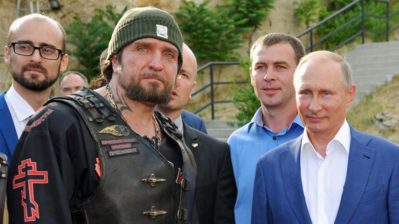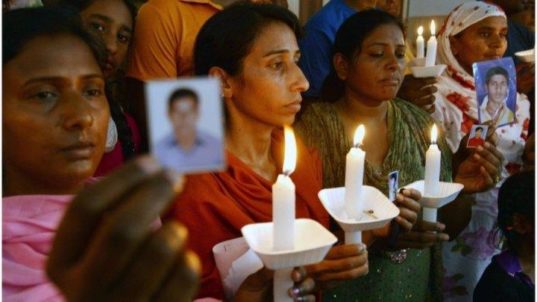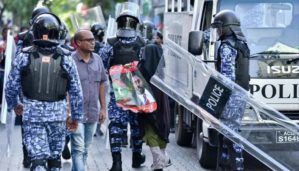|
| |
This week in:
IPSI | Africa | Americas | East Asia | Europe & Central Asia | Middle East | South Asia
|
|
|
|
| |
This week in Sub-Saharan Africa
|
|
|
|
| |
ETHIOPIA: Ruling party to choose a new leader
This week, media reported that the country’s ruling coalition will meet next Tuesday to elect a new prime minister. Hailemariam Desalegn resigned last month, saying “His resignation is vital in the bid to carry out reforms that would lead to sustainable peace and democracy.” Hailemariam’s announcement came amid a political crisis and lingering unrest in the country. Comment: A protest movement, growing since 2015, has put pressure on the coalition’s 27-year long grip on power. Hundreds of people have died in the resulting violence across Ethiopia initially sparked by an urban development plan in the capital, Addis Ababa, in 2015. The unrest spread as demonstrations against political restrictions and human rights abuses broke out. (Aljazeera, Africanews, Deutsche Welle)
|
|
|
|
|
| |
SOMALIA: Deadly car bomb blast rocks Mogadishu
On Thursday, at least 14 people died from a car bomb blast outside a popular hotel in Mogadishu. The explosion happened near Weheliye hotel on the busy Maka Al-Mukarrama Road. The bomber targeted a security vehicle, and three members of the security forces are among the dead. The road has been a target of past attacks by the Somalia-based extremist group Al-Shabaab, who claimed responsibility for the attack. Most of the casualties were traders and pedestrians. Comment: Al-Shabaab, which is fighting to overthrow Somalia’s internationally recognized government, often carries out attacks in and around the capital. Thursday’s blast comes exactly one month after two car bomb blasts in Mogadishu shattered a month-long period of calm in the city, killing at least 21 people. (Aljazeera, News24, BBC News)
|
|
|
|
|
| |
ZIMBABWE: The president pardons 3,000 prisoners to ease overcrowded prisons
On Wednesday, the Zimbabwean president pardoned up to 3,000 prisoners in a move that could help ease overcrowding in the country’s penal facilities. All women without life sentences and all juvenile prisoners, who had not yet turned 18 years-old, were granted amnesty. Prisoners with sentences under 36 months, who have served a quarter of their term, as well as terminally ill inmates, who are unlikely to survive their term, will also be freed. Comment: The prisons currently hold about 20,000 inmates but have a capacity for only 17,000. Excluded from amnesty are prisoners convicted of murder, treason, rape or other any sexual offense, carjacking, and/or armed robbery. (Aljazeera, Bloomberg, eNCA News)
Research/Written by Brian Adienge
|
|
|
|
|
| |
This week in the Americas & Caribbean
|
|
|
|
| |
PERU: President Pedro Pablo Kuczynski resigns
On Wednesday, President Kuczynski resigned from office, claiming he no longer wanted to be “an obstacle” in the way of his country’s development. The president’s resignation came one day before he was to face a second impeachment vote. The vote was scheduled after videos surfaced in which Kuczynski’s lawyer attempted to convince other lawmakers to back the president in exchange for state contracts. Although Kuczynski was not directly implicated in the vote buying scandal, his already damaged reputation could not survive more allegations of this nature. The former president claimed that these videos had been heavily edited in an effort to corrupt the public’s view. According to the Peruvian constitution, the legislature will vote on whether or not to accept the resignation. Vice-President Martín Vizcarra will become acting president in his place. Comment: This would have been the second time in three months an impeachment vote was held to decide whether Kuczynski would be ousted from office for “permanent moral unfitness” stemming from accusations of repeated lies over decade-old business ties to Brazilian firms. (BBC, Guardian, US News, WSJ)
|
|
|
|
|
| |
UNITED STATES: Austin “serial bomber” dead
On Tuesday, officers in Texas received their first major clue in the search for what they called a “serial bomber.” Surveillance footage from an Austin, Texas FedEx store caught a man in disguise dropping off a package and driving away in a truck. This footage was the first big break in a multi-week investigation that saw hundreds of FBI and local officers working together. On Wednesday, 23-year-old Mark Anthony Conditt activated a homemade bomb – following a spree of violence beginning on March 2 that had killed two and injured four others – killing himself on a motorway. Conditt left behind a 25-minute-long video on his cell phone detailing personal life challenges that had led him to commit these actions. Comment: Investigators continue to follow leads to determine if there are any more bomb threats to the community. (ABC, CNN, NBC, NYTimes, WaPo)
|
|
|
|
|
| |
VENEZUELA: Town creates own currency
On Monday, the town of Elorza began issuing their own paper currency due to the national shortage of banknotes. Officials from the town claim this currency will be easier for both tourists and residents to trade during the town’s festivities which started earlier this week. Local business leaders and officials took action after witnessing a lack of capital flow during festivities in nearby cities. Elorza is not the first town in Venezuela to enable this type of program. Comment: Venezuela has the world’s highest rate of inflation. According to a study at the end of February, prices in Venezuela had risen by more than 6,000 percent. The Central Bank of Venezuela has increased the total amount of currency in circulation by more than 50 percent in the last month. (BBC, NPR, Reuters)
Researched/Written by Connor Murnane
|
|
|
|
|
| |
This week in East Asia & Pacific
|
|
|
|
| |
MALAYSIA: Government denies hiring Cambridge Analytica to win 2013 elections
On Tuesday, Prime Minister Najib Razak’s Office issued a statement denying the allegations that the rulling party, Barisan Nasional hired Cambridge Analytica to help it win the 2013 elections. The statement came a day after a British Broadcaster aired a secretly recorded video in which the executives of the firm said they had used shell companies to disguise their activities during the elections. Razak’s Office said the company, which provides targeted advertising and other data-related services to its clients, has never been “contracted, employed or paid in any way by any part of the government.” Comment: According to Cambridge Analytica’s website, the company claims to have supported the ruling party in the 2013 elections.The firm is also at the center of controversy after reports broke that the company harvested personal data from millions of Facebook users via a personality-testing app. (South China Morning Post, Channel NewsAsia, The Sun Daily, The Washington Post)
|
|
|
|
|
| |
MYANMAR: President Htin resigns
On Monday, the President’s Office announced on Facebook that President Htin Kyaw will resign to “take a rest” due to health issues. U Zaw Htay, Director of the President’s Office, said the 71-year-old president insisted on the move following his recent surgical operation in Singapore. The statement follows recent reports that Htin has been suffering from ill health that has affected his responsibilities. Vice President Myint Swe will serve as the acting president until the parliament elects a new president within the next seven days. Comment: President Htin, who is a close friend of Aung San Suu Kyi, the state counselor, was the country’s first elected civilian president with no ties to the military since the 1962 military coup. (Channel NewsAsia, CNN, BBC)
|
|
|
|
|
| |
CHINA / PHILIPPINES: Leaders announce “prudent” cooperation on joint South China Sea exploration
On Wednesday, the foreign ministers of the two countries announced an agreement to begin a “prudent” joint exploration in the South China Sea. Chinese foreign minister Wang Yi said the South China Sea dispute will not “block” the development of the two countries. The two countries are now working on a “common legal framework” under which to conduct the joint project. The statement came one month after the Philippines announced it had begun talks with a Chinese state firm over joint exploration in the disputed South China Sea. Comment: President Duterte’s government has repeatedly stated its willingness to cooperate with China in the disputed area. Duterte’s position is a turnaround from the stance of his predecessor Benigno Aquino III who had accused Beijing of encroaching into the Philippines’ Economic Exclusive Zone. (Channel NewsAsia, Reuters, ABS-CBN News)
Researched/Written by Edgar Peter Mutta
|
|
|
|
|
| |
This week in Europe & Central Asia
|
|
|
|
| |
KOSOVO: Parliament passes demarcation agreement with Montenegro
On Wednesday, the Kosovar parliament passed a demarcation agreement with Montenegro that formalizes the boundaries between the two countries. During the vote, the opposition Self-Determination (Vetevendosje) party released tear gas four times in the parliament building. The party feels that the agreement threatens Kosovo’s sovereignty and claims that it will require Kosovo to give Montenegro 8,000 hectares of land. The wider goal of passing the agreement is for the EU to provide Kosovo with access to the Schengen zone without visas, which most regional countries already have. Comment: The border deal was originally agreed upon between the two countries in 2015, but the Kosovar parliament never ratified it until now. The Vetevendosje party has used tear gas before in parliamentary votes on bills they opposed. (Independent Balkan News Agency, EuroNews, Radio Free Europe/Radio Liberty, Reuters)
|
|
|
|
|
| |
REGIONAL: Gibraltar issue may delay EU acceptance of new Brexit transition agreement
On Monday, two Brexit negotiators, David Davis (UK) and Michel Barnier (EU), reached an agreement on a 21-month transition period for the UK to remain in the EU customs union during further negotiations. The 27 EU members must ratify the agreement by Friday, but Spain may delay the process over a disagreement on its authority over Gibraltar. Spain is requiring a clarification in the text of the agreement that allows Spain to maintain its right, during the transition period, to negotiate a bilateral agreement with the UK to decide Gibraltar’s status vis-à-vis the EU. EU officials have said they are confident that they can convince Spain to accept the agreement. Comment: Gibraltar is a British Overseas Territory at the southern tip of Spain. Spain has disputed the UK’s authority over the area. In November 2017, the EU said that Spain must agree to the status of Gibraltar in any future Brexit agreement. (The Guardian, Business Insider, POLITICO)
|
|
|
|
|
| |
REGIONAL: Authorities concerned about Russian Night Wolves tour in the Balkans
| |

|
On Tuesday, the Night Wolves – a Russian motorcycle club known for close ties with President Putin – started their 9-day tour of what they consider to be the “Russian Balkans.” Their stated purpose for the tour is to examine the “cultural influence of the Russian empire in the Balkans.” Dragan Mektic, Bosnia’s security minister, said the club “could provoke certain tensions and create fear.” The group, also called “Putin’s Angels,” plans to visit Bosnia and Herzegovina, Serbia, and other Serb-majority regions, despite a ban on their leaders in Bosnia and Herzegovina. There is also a planned meeting with the President of Republika Srpska, who has made demands for secession in the past which, if granted, would breach the Dayton Accords. Comment: The Night Wolves were involved in the “pro-Russian separatist insurgency in Ukraine” in 2014. The following year, the club was blocked from riding through Poland because of its actions in Ukraine and for their reverence of Josef Stalin. (Balkan Insight, Radio Free Europe/Radio Liberty 1, 2, Al Jazeera)
Researched/Written by Daniel Boerger
|
|
|
|
|
| |
This week in the Middle East & North Africa
|
|
|
|
| |
EGYPT: Sudan’s president visits Cairo amid easing tensions
On Monday, The Sudanese President Omar al-Bashir met Egypt’s President Abdel Fattah el-Sisi in Cairo as part of a one-day trip for the first time since October 2016. The visit aimed at mending ties and boosting cooperation after a period of tensions. Relations deteriorated between the neighboring countries last year when Al-Bashir accused Egypt’s intelligence services of supporting opposition forces fighting against his troops in the Sudanese region of Darfur. Comment: The visit came a few days after Egypt’s Minister of Foreign Affairs visited South Sudan to support Juba’s request to join the Arab league. (Aljazeera, Egypt Independent, News 24)
|
|
|
|
|
| |
PALESTINE: President Abbas blames Hamas for attack in Gaza on PM’s convoy
On Monday, the President of the Palestinian Authority (PA), Mahmoud Abbas, accused Hamas of orchestrating last week’s bomb attack on the convoy of PA Prime Minister Rami Hamdallah as he entered the Gaza Strip. Within hours of the explosion, Hamas said it was launching an investigation to uncover who was behind the attack. On Thursday, Hamas reported that its security forces in Gaza shot dead the primary suspect. Comment: The attack came as a blow to recent rapprochement efforts between the PA and Hamas. Hamas fighters had driven the PA out of Gaza a decade ago, but both sides have agreed to a reconciliation deal brokered by Egypt. The deal, signed in 2017, granted the PA administrative and security control in Gaza. (Aljazeera, Reuters, Washington Post)
|
|
|
|
|
| |
SYRIA: First rebels leave defeated Eastern Ghouta town
On Thursday, the first group of Syrian rebels and their families began leaving the town of Harasta in the besieged Eastern Ghouta area as part of an evacuation deal with the government brokered by Russia. The deal was reached on Wednesday after a meeting between a Syrian government delegation and representatives of residents and fighters in rebel-held Harasta. The Syrian State media said 72 rebels and 452 civilians had departed from Harasta so far. Addounia TV, a state-run outlet, said that 1,500 gunmen and 6,000 family members would be evacuated on Thursday in two groups to Idlib. Comment: The Syrian army has now recaptured 80 percent of Eastern Ghouta, which lies on the outskirts of the capital, Damascus. According to the White Helmets, a voluntary rescue group operating in parts of rebel-controlled Syria, at least 1,252 documented civilians have been killed in the offensive. More than 4,000 people have been wounded, with 2,990 air raids targeting the region. (Aljazeera, BBC, Reuters)
Researched/Written by Mohamed Ismail
|
|
|
|
|
| |
INDIA: Thirty-nine construction workers held by self-proclaimed Islamic State in Mosul confirmed dead

|
|
On Tuesday, India’s External Affairs Minister, Sushma Swaraj, confirmed that they found the remains and DNA samples of 39 Indian construction workers in a mass grave in Mosul, Iraq. The self-proclaimed Islamic State (IS) kidnapped the workers in June 2014 when they took control of the city. The mass grave is near Badush, a village about six miles from the construction site where IS kidnapped the workers. The Indian government maintained that some of the hostages could still be alive – saying it would not announce their deaths without concrete DNA evidence. Comment: India confirmed in June 2014 that IS kidnapped 40 Indian workers of the Tariq Nur Al Huda company in Mosul. One of the workers managed to escape, returned to India in 2015, and told a news website that IS fighters took him and his colleagues to Badush before gunning them down four days later. (Hindustan Times, The Times of India, Al Jazeera, The Guardian)
|
|
|
|
|
| |
MALDIVES: Police arrest more than 140 protesters who had defied state of emergency
| |

|
On Saturday, a police spokesman confirmed that authorities arrested 141 opposition protesters on Friday night as they had attempted to defy orders under the state of emergency by marching into the high security zone in the capital, Male. President Abdulla Yameen extended the state of emergency he had issued on February 5, following an order made by the Supreme Court to release nine opposition leaders, until March 22. The protesters sought the arrest of President Yameen and the enforcement of the Supreme Court ruling that called for the release of opposition leaders. Witnesses of the protest reported that masked special operations policemen arrested several protesters, while riot police employed shields, pepper spray, and tear gas. According to the police, they released the majority of those arrested by Sunday – excluding five people. Comment: UN human rights chief, Zeid Ra’ad Al Hussein, described the state of emergency as “an all-out assault on democracy,” and Amnesty International stated that the police detained the protesters “solely for exercising their rights to freedom of expression and peaceful assembly.” President Yameen lifted the 45-day state of emergency on Thursday March 22 with hearings against high profile opposition detainees facing terrorism and bribery charges, currently underway. (Maldives Independent 1, 2, Mihaaru, Hindustan Times, Al Jazeera, Reuters)
|
|
|
|
|
| |
SRI LANKA: Nationwide state of emergency lifted
On Sunday, President Maithripala Sirisena lifted the nationwide 10-day state of emergency he had imposed on March 6 due to communal violence between Sinhalese and Muslim civilians in the central Kandy District. During the state of emergency, Sri Lankan authorities could arrest and detain suspects for long periods if they had deemed it to be necessary. Police arrested nearly 300 people, including a hard-line Buddhist organization leader they suspect of inciting the violence. The army, which President Sirisena deployed following the clashes, reported that the situation is now suitable for civil administration. Comment: Two people died in the violence with dozens left injured and more than 450 Muslim-owned homes and damaged. (Colombo Page, Al Jazeera, BBC News, Reuters)
Researched/Written by Pamela Mhute
|
|
|
|